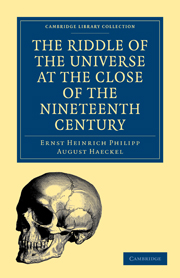Book contents
- Frontmatter
- Contents
- PREFACE
- AUTHOR'S PREFACE
- CHAPTER I THE NATURE OF THE PROBLEM
- CHAPTER II OUR BODILY FRAME
- CHAPTER III OUR LIFE
- CHAPTER IV OUR EMBRYONIC DEVELOPMENT
- CHAPTER V THE HISTORY OF OUR SPECIES
- CHAPTER VI THE NATURE OF THE SOUL
- CHAPTER VII PSYCHIC GRADATIONS
- CHAPTER VIII THE EMBRYOLOGY OF THE SOUL
- CHAPTER IX THE PHYLOGENY OF THE SOUL
- CHAPTER X CONSCIOUSNESS
- CHAPTER XI THE IMMORTALITY OF THE SOUL
- CHAPTER XII THE LAW OF SUBSTANCE
- CHAPTER XIII THE EVOLUTION OF THE WORLD
- CHAPTER XIV THE UNITY OF NATURE
- CHAPTER XV GOD AND THE WORLD
- CHAPTER XVI KNOWLEDGE AND BELIEF
- CHAPTER XVII SCIENCE AND CHRISTIANITY
- CHAPTER XVIII OUR MONISTIC RELIGION
- CHAPTER XIX OUR MONISTIC ETHICS
- CHAPTER XX SOLUTION OF THE WORLD-PROBLEMS
- INDEX
CHAPTER XVI - KNOWLEDGE AND BELIEF
Published online by Cambridge University Press: 05 August 2011
- Frontmatter
- Contents
- PREFACE
- AUTHOR'S PREFACE
- CHAPTER I THE NATURE OF THE PROBLEM
- CHAPTER II OUR BODILY FRAME
- CHAPTER III OUR LIFE
- CHAPTER IV OUR EMBRYONIC DEVELOPMENT
- CHAPTER V THE HISTORY OF OUR SPECIES
- CHAPTER VI THE NATURE OF THE SOUL
- CHAPTER VII PSYCHIC GRADATIONS
- CHAPTER VIII THE EMBRYOLOGY OF THE SOUL
- CHAPTER IX THE PHYLOGENY OF THE SOUL
- CHAPTER X CONSCIOUSNESS
- CHAPTER XI THE IMMORTALITY OF THE SOUL
- CHAPTER XII THE LAW OF SUBSTANCE
- CHAPTER XIII THE EVOLUTION OF THE WORLD
- CHAPTER XIV THE UNITY OF NATURE
- CHAPTER XV GOD AND THE WORLD
- CHAPTER XVI KNOWLEDGE AND BELIEF
- CHAPTER XVII SCIENCE AND CHRISTIANITY
- CHAPTER XVIII OUR MONISTIC RELIGION
- CHAPTER XIX OUR MONISTIC ETHICS
- CHAPTER XX SOLUTION OF THE WORLD-PROBLEMS
- INDEX
Summary
The knowledge of the truth and its sources: the activity of the senses and the association of presentations. Organs of sense and organs of thought. Sense-organs and their specific energy. Their evolution. The philosophy of sensibility. Inestimable value of the senses. Limits of sensitive knowledge. Hypothesis and faith. Theory and faith. Essential difference of scientific (natural) and religious (supernatural) faith. Superstition of savage and of civilized races. Confessions of faith. Unsectarian schools. The faith of our fathers. Spiritism. Revelation.
Every effort of genuine science makes for a knowledge of the truth. Our only real and valuable knowledge is a knowledge of nature itself, and consists of presentations which correspond to external things. We are incompetent, it is true, to penetrate into the innermost nature of this real world—the “thing in itself”—but impartial critical observation and comparison inform us that, in the normal action of the brain and the organs of sense, the impressions received by them from the outer world are the same in all rational men, and that in the normal function of the organs of thought certain presentations are formed which are everywhere the same. These presentations we call true, and we are convinced that their content corresponds to the knowable aspect of things. We know that these facts are not imaginary, but real.
All knowledge of the truth depends on two different, but intimately connected, groups of human physiological functions: firstly, on the sense-impressions of the object by means of sense-action, and, secondly, on the combination of these impressions by an association into presentations in the subject.
- Type
- Chapter
- Information
- Publisher: Cambridge University PressPrint publication year: 2009First published in: 1900

